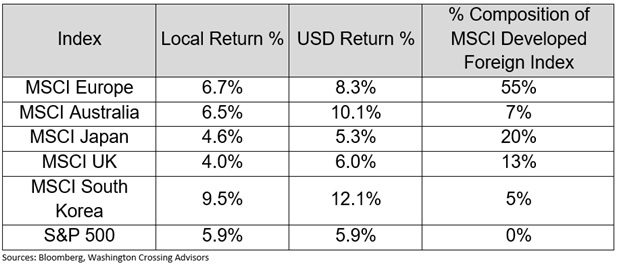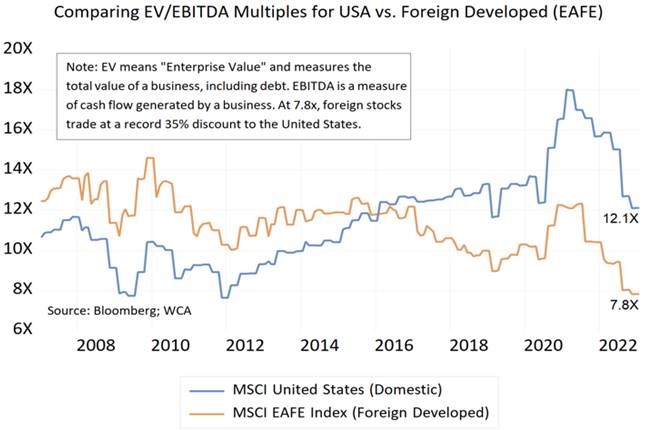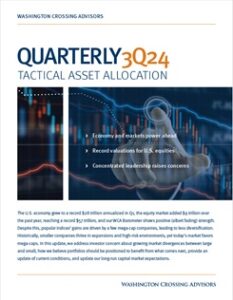Eyes Overseas
With 2022 in the rearview mirror, we have hit the ground running, eager to shake off the previous year’s dour market mood. Despite the prospects of recession, persistent (albeit declining) inflation, and restrictive central bank policies, we see pockets of momentum and optimism in 2023, particularly in foreign developed markets. For the past decade, U.S. equities dominated and were the most sought after markets for risk assets. However, this situation is changing.
Rising Returns
One month into the New Year, we are seeing strong gains across the board in foreign markets. The following table provides local currency and USD returns for several overseas stock markets. While the S&P 500 has enjoyed a rise of 6+% year to date, it has taken a back seat to the likes of Europe, Australia, and South Korea.

Currency Headwinds Tailwinds
When investing overseas, we are not only investing in local markets, but also the local currency. In addition to the stock gains mentioned above, foreign currencies have appreciated vis-à-vis the USD, further boosting returns for U.S. investors. We believe there is continued momentum favoring foreign markets as the value of the dollar weakens. As a result, our WCA Conquest Tactical Asset Allocation Portfolio weightings in foreign developed markets went from underweight, to neutral, to overweight over the past nine months.
Better Value Overseas
Foreign developed and U.S. stocks now trade at Enterprise Value to EBITDA multiples of roughly 8x and 12x, respectively (see Chart A). Of note, overseas markets have not traded at such a low multiple in the past 15+ years. Taking it one step further, we compare the U.S. to foreign EV/EBITDA multiple in Chart B. Today, foreign stocks trade at a 35% discount relative to the U.S. The disparity between foreign and U.S. valuations point to better value overseas.
Chart A

Chart B

Improving Outlook
China’s recent decision to scrap their draconian “Zero-Covid” policy and fully reopen their economy to the world has many excited about a spike in growth for the world’s most populous country. An unexpectedly mild winter throughout Europe and extensive government subsidization efforts have lessened the blow of expensive oil and natural gas as a result of Russia’s war with Ukraine. This has meant more money in consumers’ pockets to spend on other things, improving the outlook in Europe.
Conclusion
Indeed, many are focusing their attention on foreign developed markets due to the attractive entry valuations, potential for earnings growth, and momentum. While this doesn’t signal an immediate withdrawal from U.S. stocks, it cannot be ignored. At Washington Crossing Advisors, our Conquest ETF Asset Allocation strategy makes portfolio weight changes based off of a myriad of economic readings and indicators, such as the currency exchange rates and foreign valuations mentioned above. By remaining disciplined and letting data inform decisions, we believe we can better tactically manage the portfolio from a top-down perspective as the global economy continues to evolve in front of our eyes.



